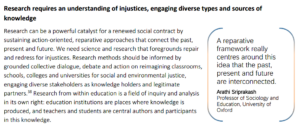Unesco – Renewing the Social Contract for Education
In December 2024, UNESCO held its first International Forum on the Futures of Education. The event took place in Suwon, Gyeonggido, Republic of Korea. The Repair-Ed Project was thrilled to contribute to this landmark event, with Arathi Sriprakash offering insights from our research to multiple sessions.
The UNESCO team has now published a major new report as an outcome of the International Forum.
We are delighted that key ideas from the Reparative Futures of Education Project have shaped UNESCO’s ongoing work.
Below we share an extract from the report on how education must repair past harms and reimagine futures through care, justice and inclusion (Unesco 2025, p.31)
“Reparative pedagogy, as conceptualized by scholars like Sriprakash, invites us to consider how education can act as a site of repair and justice. It asks: What harms has education enacted, and what responsibilities arise from that history? Rather than viewing learning as a neutral process, reparative pedagogy foregrounds historical and structural injustices while opening space for hope, relationality and care. It understands pedagogical work as involving emotional and political labour, recognizing the profound entanglements in processes of meaning-making, identity formation and transformation.
This interplay is vital: learners do not just know, they also feel their way into understanding. Educational futures must take this into account. In practical terms, this transformative vision demands political, policy-based, ethical and technical conversations that bridge global innovation with local realities. There is much to be learned, for example, from Indigenous learning models and pedagogical approaches in non-formal education spaces which seek to address historical and structural injustices though the fostering of dialogue, the creation of meaning and understanding, and the imagination of new social possibilities.” (UNESCO 2025, p.31)

